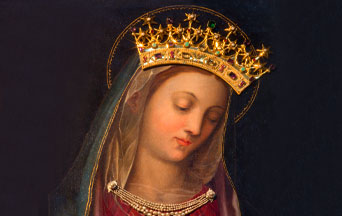
Among the many miraculous images of the Mother of God through which she deigns to grant her favors, there is one in the monastery church of the Carmelites in Vienna, entitled the Mother of Grace, or Our Lady of Grace, also known as Our Lady of the Bowed Head.
In 1610 a Carmelite, Dominic of Jesus-Mary, found among the votaries of an old altar in the monastery church of Maria Della Scala in Rome an oil painting of the Mother of God, dust-covered and somewhat torn, which grieved him. Taking it into his hands, he shook the dust off it and, kneeling down, venerated it with great devotion.
He had the picture renovated and placed it on the shelf in his cell, where he made it the object of his love and supplications in favor of those who came to him in their necessities and afflictions.
One night while he was praying fervently before the picture, he noticed that some dust had settled on it. Having nothing but his coarse woolen handkerchief, he dusted it with that and apologized,
“O pure and holiest Virgin, nothing in the whole world is worthy of touching your holy face, but since I have nothing but this coarse handkerchief, deign to accept my good will.”
To his great surprise, the face of the Mother of God appeared to take on life, and smiling sweetly at him, she bowed her head, which thereafter remained inclined.
 Learn All About the Prophecies of Our Lady of Good Success About Our Times
Learn All About the Prophecies of Our Lady of Good Success About Our Times
Fearing he was under an illusion, Dominic became troubled, but Mary assured him that his requests would be heard: he could ask of her with full confidence any favor he might desire. He fell upon his knees and offered himself entirely to the service of Jesus and Mary and asked for the deliverance of one of his benefactor’s souls in purgatory. Mary told him to offer several Masses and other good works; a short time after, when he was again praying before the image, Mary appeared to him bearing the soul of his benefactor to Heaven. Dominic begged that all who venerated Mary in this image of Our Lady of Grace might obtain all they requested. In reply, the Virgin gave him this assurance:
“All those who devoutly venerate me in this picture and take refuge to me will have their request granted, and I will obtain for them many graces, but especially will I hear their prayers for the relief and deliverance of the souls in purgatory.”
Dominic soon after placed the image into the church of Maria Della Scala so that more devotees of Mary could venerate it. Many wonderful favors were obtained by those who honored and invoked Mary here. Reproductions were made of Our Lady of Grace and sent to different parts of the world.
After the death of Dominic, the original painting was lent to Prince Maximilian of Bavaria. He gave it to the discalced Carmelites in Munich in 1631; they gave it to Emperor Ferdinand II of Austria and his wife, Eleanore. After Ferdinand’s death, Eleanore entered the Carmelite convent in Vienna and took the picture with her. During the succeeding years, the image was transferred to various places.
Today it is in the monastery church of Vienna Doabling. On 27 September 1931, it was solemnly crowned by Pope Pius XI—its 300th anniversary of arrival in Vienna.

